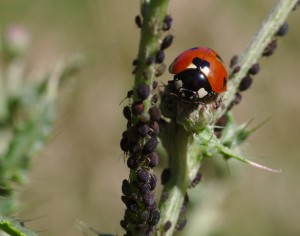Organic farming can simultaneously improve pest control and yield
A new study published in the journal Landscape Ecology sought to determine how farming type and landscape heterogeneity affect pests and their natural enemies and to understand how these changes influence yields. Researchers compared insect diversity on conventional farms, new organic farms and old organic farms and collected data on the amount of pasture and the length of field borders for each farm. They found that different pest species were affected differently by differing amounts of landscape complexity with some pest species and that some pest species, such as aphids, were reduced in organically farmed fields due to an increase in natural predators while others exhibited no change based on farming type. These results suggest that under organic farming, it is possible to reduce aphid pests and increase yields by supporting predator insect communities.



